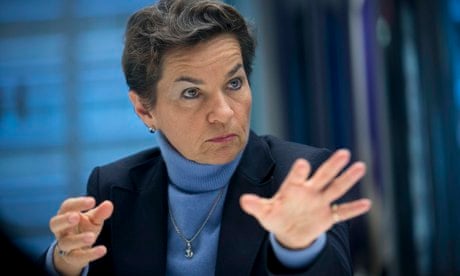The United Nations climate chief has urged global financial institutions to triple their investments in clean energy to reach the $1 trillion a year mark that would help avert a climate catastrophe.
In an interview with the Guardian, the UN's Christiana Figueres urged institutions to begin building the foundations of a clean energy economy by scaling up their investments.
Global investment in clean technologies is running at about $300bn a year – but that is nowhere where it needs to be, Figueres said.
"From where we are to where we need to be, we need to triple, and we need to do that – over the next five to 10 years would be best – but certainly by 2030," she said.
The International Energy Agency said four years ago it would take $1tn a year in new infrastructure projects by 2030 to make the shift from a coal- and oil-based economy to the cleaner fuels and technologies that would help keep warming below the dangerous threshold of 2C.
But investment has lagged far behind. "What we need to have invested in the energy sector and in the green infrastructure in order to make the transformation that we need in order to stay within 2C is one trillion dollars a year and we are way, way behind that," Figueres said.
Figueres and leading Wall Street figures will urge global investors to step up their clean energy investments at a meeting at the UN on Wednesday organised by the Ceres investment network.
The biggest investors – pension funds, insurance companies, foundations and investment managers – control about $76tn in assets, according to OECD figures.
But by Figueres's estimate, those institutional investors were committing less than 2% of the funds under their control to clean energy infrastructure – compared to 10% or 15% that was still going into coal and oil.
"Last year, we had $300bn, and in the same year we had double that amount invested in exploration and mining in fossil fuels. So you can see that the ratio is not where it needs to be. We need to be at the opposite ratio."
The UN climate official said she hoped to make her case by showing the opportunities in clean tech investment – but also the financial risks of sticking with coal and oil.
The UN's climate panel, the Intergovernmental Panel on Climate Change, said for the first time in its blockbuster climate report last September that there was a finite amount of carbon that could be burnt to stay within 2C warming.
About half of that carbon budget is already spent – which means much of the remaining coal and oil can not be burned without crossing into dangerous warming.
"There is no doubt that most of the fossil fuel reserves we have world-wide will have to stay in the ground" to avoid warming beyond 2C, Figueres said.
"Two-thirds of the fossil fuels we have will have to stay in the ground."
She argued those realities would eventually erode the value of oil and coal holdings. Climate experts have already taken to referring to such carbon stores as "stranded assets".
"There is study after study coming out saying beware we are invested in assets that are already and will soon be losing value," she said.
Diplomats hope this week's investor summit will energise efforts to reach a global emissions-cutting deal in 2015.
The gathering is the first of a number of big climate-themed gatherings set for 2014, culminating with an invitation to world leaders by the UN secretary-general, Ban Ki-moon, to a summit in September to try to get the outlines of that deal in place.
In Washington, meanwhile, Barack Obama is expected to finalise new limits on greenhouse gas emissions from power plants – a critical step if the US is to reach its pledge to cut greenhouse gas emissions 17% by 2020.
But global investment is still not keeping place. Bloomberg New Energy Finance put global investment in clean technology at just $281bn in 2012 – and the figures for 2013, due for release at the investor summit on Wednesday, are expected to fall even lower.
That would mean a quadrupling of clean tech investment – instead of the tripling in investment that Figueres estimates.
"Cost competitive renewable technologies and attractive investment opportunities exist right now, but we're still not seeing clean energy deployment at the scale we need to put a dent in climate change," said Mindy Lubber, the president of Ceres, which organised this week's summit.
"We need to find a way to get more institutional investor capital into this space."

Comments (…)
Sign in or create your Guardian account to join the discussion